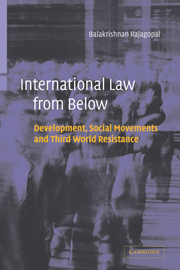Book contents
- Frontmatter
- Contents
- Abbreviations
- Preface and Acknowledgments
- Introduction
- PART I International law, development, and Third World resistance
- PART II International law, Third World resistance, and the institutionalization of development: the invention of the apparatus
- PART III Decolonizing resistance: human rights and the challenge of social movements
- PART IV Epilogue
- References
- Index
PART III - Decolonizing resistance: human rights and the challenge of social movements
Published online by Cambridge University Press: 09 July 2009
- Frontmatter
- Contents
- Abbreviations
- Preface and Acknowledgments
- Introduction
- PART I International law, development, and Third World resistance
- PART II International law, Third World resistance, and the institutionalization of development: the invention of the apparatus
- PART III Decolonizing resistance: human rights and the challenge of social movements
- PART IV Epilogue
- References
- Index
Summary
“Civilization must, unfortunately, have its victims”
Part II offered an analysis of how the disciplines of international law and international institutions shaped and were shaped by Third World resistance to the deployment of ‘development’ beginning with the Mandate system and accelerating during the post-War period – in short, how development was ‘received’ – and how this process has generated the apparatuses of international law and development. This Part proposes to describe and analyze how development, as an ensemble of practices and discourses of a particular form of western modernity, has been ‘resisted’ by the Third World through international law, and what the limitations of that resistance has been. Specifically, I am interested in investigating the constitution of the modern human-rights discourse as the sole approved discourse of resistance, and the peculiar blind spots and biases towards the violence of development that this resulted in. The limitations to the human-rights discourse as a complete liberatory and emancipatory discourse that could tame the violence of development has been reflected in the range of resistance encountered by development in the Third World. Much of this resistance has been in the form of popular movements against the cultural, economic and political effects of modernization and development since the 1970s in the Third World. Despite this, these “other” forms of resistance to development are not cognizable within the apparatuses and discourse of human rights, even though they form an increasingly important source of identity formation for individuals and communities, and have begun to have significant influence on the making of states and the practices of international organizations.
- Type
- Chapter
- Information
- International Law from BelowDevelopment, Social Movements and Third World Resistance, pp. 163 - 170Publisher: Cambridge University PressPrint publication year: 2003



